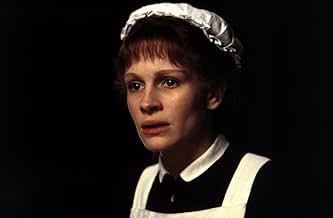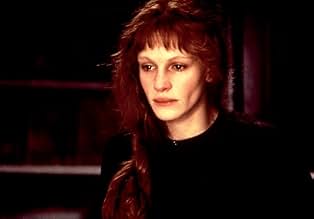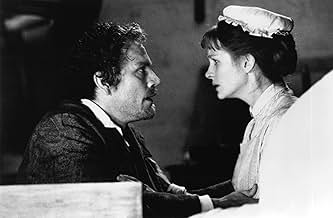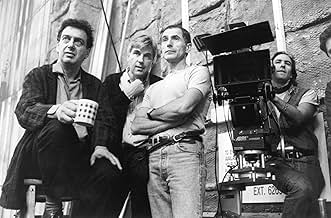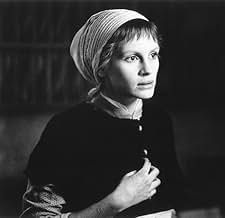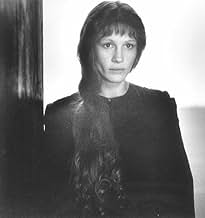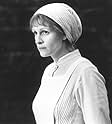A housemaid falls in love with Dr. Henry Jekyll and his darkly mysterious counterpart, Mr. Edward Hyde.A housemaid falls in love with Dr. Henry Jekyll and his darkly mysterious counterpart, Mr. Edward Hyde.A housemaid falls in love with Dr. Henry Jekyll and his darkly mysterious counterpart, Mr. Edward Hyde.
- Director
- Writers
- Stars
- Awards
- 6 nominations total
Ciarán Hinds
- Sir Danvers Carew
- (as Ciaran Hinds)
- Director
- Writers
- All cast & crew
- Production, box office & more at IMDbPro
5.816.5K
1
2
3
4
5
6
7
8
9
10
Featured reviews
Nothing Wrong With A Little Subetly Once In A While
I am glad to see a few other reviewers calling this "underrated." I figured I was the only person who actually liked this film. All the national critics sure hated this low-key re-telling of Jekyll and Hyde.
The muted colors with the grey overtones caught my eye and were very interesting to observe. Julia Roberts also was interesting to watch: no makeup, no smile, just sad, somber looks yet still appealing. Despite critics' comments to contrary, I found this an intelligent adaption of the famous story.
People don't care for subtly in films anymore. They want in-your-face smash- ups, gore, violent contrasts....and a lot of it. This movie is extremely low-key and subtle, although there are some bloody scenes.
I have to admit that I agree with one criticism, that it's hard to believe Roberts' character "Mary Reilly" would not recognize Jekyll from Hyde (played by John Malkovich) when he didn't change facial appearances! And, yes, the film, generally- speaking, is a real downer, a depressing tale.
Yet, for some odd reason, despite the above paragraph, I recommend the film to people who enjoy slower films and subtle suspense, even if they have to suspend a little believability. I thought it was oddly fascinating.
The muted colors with the grey overtones caught my eye and were very interesting to observe. Julia Roberts also was interesting to watch: no makeup, no smile, just sad, somber looks yet still appealing. Despite critics' comments to contrary, I found this an intelligent adaption of the famous story.
People don't care for subtly in films anymore. They want in-your-face smash- ups, gore, violent contrasts....and a lot of it. This movie is extremely low-key and subtle, although there are some bloody scenes.
I have to admit that I agree with one criticism, that it's hard to believe Roberts' character "Mary Reilly" would not recognize Jekyll from Hyde (played by John Malkovich) when he didn't change facial appearances! And, yes, the film, generally- speaking, is a real downer, a depressing tale.
Yet, for some odd reason, despite the above paragraph, I recommend the film to people who enjoy slower films and subtle suspense, even if they have to suspend a little believability. I thought it was oddly fascinating.
Eerily memorable
OK, so this film was trashed by the critics... and I would bet a fortune that the average MTV generation movie-goer will practically fall asleep watching it - but I posit that their trouble with this film says more about them than it does about Frear's Gothic tale.
There are weaknesses - above all the fact that everyone else (including Julia Roberts ) has an accent but Malkovitch refuses to even attempt one. What's an American accent doing in the middle of all this? Malkovitch also seems to be channeling his own performance in Frear's masterpiece, Dangerous Liaisons - but if you haven't seen that film you should love what he does in this one.
But other than that, I found the slow pace to be totally gripping... The entire story is told from the viewpoint of Mary Reilly, and I have never seen Julia Roberts do a better job than here. She is wonderfully effective... it is worth watching this film only for her performance. But it is also worth watching because of the attention to period detail. You really get a feeling of what it must have been like to live in the 19th century. The manners, the utensils, the class differences...the psycho-sexual straight-jacket.
I will not give any details about the film - I'll let those who watch it discover it for themselves. But I would like to say one thing about the pace. This is not an action film, it is not even a horror film in the traditional sense. It is mainly a story of discovery - dealing with the slow realization of hidden desires and uncontrolled motivations; as such it should not - nay, could not be done at a quicker pace. It's really too bad that fewer and fewer people today seem to be capable of watching something that is subtle and slow. The loss is theirs.
There are weaknesses - above all the fact that everyone else (including Julia Roberts ) has an accent but Malkovitch refuses to even attempt one. What's an American accent doing in the middle of all this? Malkovitch also seems to be channeling his own performance in Frear's masterpiece, Dangerous Liaisons - but if you haven't seen that film you should love what he does in this one.
But other than that, I found the slow pace to be totally gripping... The entire story is told from the viewpoint of Mary Reilly, and I have never seen Julia Roberts do a better job than here. She is wonderfully effective... it is worth watching this film only for her performance. But it is also worth watching because of the attention to period detail. You really get a feeling of what it must have been like to live in the 19th century. The manners, the utensils, the class differences...the psycho-sexual straight-jacket.
I will not give any details about the film - I'll let those who watch it discover it for themselves. But I would like to say one thing about the pace. This is not an action film, it is not even a horror film in the traditional sense. It is mainly a story of discovery - dealing with the slow realization of hidden desires and uncontrolled motivations; as such it should not - nay, could not be done at a quicker pace. It's really too bad that fewer and fewer people today seem to be capable of watching something that is subtle and slow. The loss is theirs.
This film gets better as you watch it
Initially, I stayed away from this movie as it received merciless reviews. The fact that Julia Roberts was in it also was another obstacle. Yet as other reviewers have mentioned, she actually gives a good performance. John Malkovich is excellent as the tormented Jekyll/Hyde character.
The cinematography and moods are haunting. One feels they are actually re-living the Victorian era, where the servants woke up at 4AM to complete their drudgery. The kitchen conjures up the stark realities of survival, the eel that is chopped up for dinner (while alive) Mary Reilly turns white as a sheet as she sees the animal die. I actually began to appreciate Ms. Roberts' performances more after this film (also in films like "Mona Lisa Smile", she projects a certain believability; is not just a physical presence). At one point, there is a most effective scene wherein Roberts must see to her mother's burial, and goes to the tenement to make arrangements. The landlord has placed her mother's body in a damp cellar closet, saying she is "most comfortable" as he hands her one shilling, the only money Roberts will inherit. Roberts then says; ..."ä poor wage for a lifetime of drudgery"... We are reminded of the workhouses of Dickens, and the rigid class structures which she must survive...
While the dialect is at times choppy, she is believable as an Irish maid; and the supporting cast also lends credence to this story. Malkovich varies his performance between Jekyll/Hyde, and it is effective and visceral.
If you initially avoided this film, I would highly recommend seeing it now. The atmosphere and music are haunting and sad. 9/10
The cinematography and moods are haunting. One feels they are actually re-living the Victorian era, where the servants woke up at 4AM to complete their drudgery. The kitchen conjures up the stark realities of survival, the eel that is chopped up for dinner (while alive) Mary Reilly turns white as a sheet as she sees the animal die. I actually began to appreciate Ms. Roberts' performances more after this film (also in films like "Mona Lisa Smile", she projects a certain believability; is not just a physical presence). At one point, there is a most effective scene wherein Roberts must see to her mother's burial, and goes to the tenement to make arrangements. The landlord has placed her mother's body in a damp cellar closet, saying she is "most comfortable" as he hands her one shilling, the only money Roberts will inherit. Roberts then says; ..."ä poor wage for a lifetime of drudgery"... We are reminded of the workhouses of Dickens, and the rigid class structures which she must survive...
While the dialect is at times choppy, she is believable as an Irish maid; and the supporting cast also lends credence to this story. Malkovich varies his performance between Jekyll/Hyde, and it is effective and visceral.
If you initially avoided this film, I would highly recommend seeing it now. The atmosphere and music are haunting and sad. 9/10
Subtly thrilling
Not many movies can get away with keeping Julia Roberts from smiling, but Mary Reilly does so well. It's a movie of subtleties and moods. Its dark themes deal with the oppression of a strict, class-based society in Victorian England as well as the secrets that we all hide inside our hearts. The familiar tale takes intriguing new turns from the viewpoint of the house's servants. John Malkovich, while a tad thin on his English accent, delivers a fantastic performance as both Jekyll and Hyde as he plumbs the depths of morality and the human soul. Hyde is a stark contrast of freedom among the restrained servants of the Jekyll house, and his subtle sexual innuendoes quietly violate the chastity of Victorian stereotypes. Much of the violence occurs off camera until near the climax of the film, which may be one of it's shortcomings. The film is very quiet and slow and may put some viewers to sleep. Another issue I had was the lovely Henson-Workshop-provided effects at the end, which are imaginative, but don't make a bit of sense when compared to the rest of the film. If you can stomach a quiet and very subtle thriller, however, this is a real gem.
Underrated Film
This has to be one of the most maligned films of the past couple of years; it's virtually shoved under the carpet every time Julia Robert's career is mentioned and it's generally dismissed as a bore. And in a lot of ways, it IS boring; not a lot happens during the course of the plot and as a horror film it utterly fails to provide a sense of urgency and fright in the conventional sense.
It's also one of the most elaborate, mysterious and beautifully conceived big-budget fantasies committed to film. The fact of its plodding storyline is, in a sense, besides the point of its true merit; that it is a dark, intensely brooding look at a woman's damaged sexuality and psyche and the oppressive times in which she existed. The original Valerie Martin book ingeniously transmogrified the Robert Louis Stevenson story into an examination of a lost female soul who finds her redemption in a fog-shrouded hell. Stephen Frear's film is in every respect a successful mood piece, a meditation on an individual's dark journey into not just a world of physical violence but her own crippled sense of selfhood and history of abuse. More than most other contemporary films about the Victorian era, this film captures in meticulous and visceral detail the horrors of the Industrial Age---the poverty, the pollution-ridden streets filled with animal gore and filth, and the era's preoccupation/repulsion of the human body and the ominous glare of scientific knowledge gone awry in a society ill-prepared to meet the consequences. The cinematography and production design (by the great Stuart Craig) are breathtaking. A swinging door, partially obscuring the surgically opened corpse on a table...Mary making her way through the streets of the market, surrounded by animal viscera...the shock of a roomful of a prostitute's remains, savagely gutted by a demonic hand...rats in the sewer, swarming into the crevices of Mary's mind...the Doctor's operating theater, like a coliseum of depravity...Mary, lost in the fog.
These images were indelible to me and entertained my consciousness far more than any typical horror film could hope to. Julia Roberts, for all her trouble with the Irish accent and going against her image as "America's sweetheart", is the very picture of a haunted and ravaged soul, nearly destroyed by the abuse and poverty of her childhood and bewildered by the mysterious machinations of her homicidal employer. She lends a great deal of vulnerability and conviction to her role and carries the film in ways beyond dialogue and posturing. Not once does she flash her trademark million-dollar smile but what she gives to the film is far more valuable than glitz and in her looks and inflections reveals more on-screen than most of her other films combined.
This film won't appeal to most people. And admittedly, it does fail in so many ways that a lot of audiences will be turned off. A lot of people will definitely be bored to tears by the slow pace and "what the H*ll is happening?!?!?" quality of the narrative. But for viewers who liked Cocteau's "Beauty and the Beast", Neil Jordan's "Comany of Wolves" Caleb Carr's book "The Alienist" or perhaps Ken Russell's "Gothic", this is worth a try. It should not be written off as just another big-budget Hollywood failure, because its aims, whether conscious or not, are quite different from your average thriller or period film. Approach it with an open mind, be prepared for a dark and disconcerting vision, and you might be rewarded because this film is unique, baroque, different and great.
It's also one of the most elaborate, mysterious and beautifully conceived big-budget fantasies committed to film. The fact of its plodding storyline is, in a sense, besides the point of its true merit; that it is a dark, intensely brooding look at a woman's damaged sexuality and psyche and the oppressive times in which she existed. The original Valerie Martin book ingeniously transmogrified the Robert Louis Stevenson story into an examination of a lost female soul who finds her redemption in a fog-shrouded hell. Stephen Frear's film is in every respect a successful mood piece, a meditation on an individual's dark journey into not just a world of physical violence but her own crippled sense of selfhood and history of abuse. More than most other contemporary films about the Victorian era, this film captures in meticulous and visceral detail the horrors of the Industrial Age---the poverty, the pollution-ridden streets filled with animal gore and filth, and the era's preoccupation/repulsion of the human body and the ominous glare of scientific knowledge gone awry in a society ill-prepared to meet the consequences. The cinematography and production design (by the great Stuart Craig) are breathtaking. A swinging door, partially obscuring the surgically opened corpse on a table...Mary making her way through the streets of the market, surrounded by animal viscera...the shock of a roomful of a prostitute's remains, savagely gutted by a demonic hand...rats in the sewer, swarming into the crevices of Mary's mind...the Doctor's operating theater, like a coliseum of depravity...Mary, lost in the fog.
These images were indelible to me and entertained my consciousness far more than any typical horror film could hope to. Julia Roberts, for all her trouble with the Irish accent and going against her image as "America's sweetheart", is the very picture of a haunted and ravaged soul, nearly destroyed by the abuse and poverty of her childhood and bewildered by the mysterious machinations of her homicidal employer. She lends a great deal of vulnerability and conviction to her role and carries the film in ways beyond dialogue and posturing. Not once does she flash her trademark million-dollar smile but what she gives to the film is far more valuable than glitz and in her looks and inflections reveals more on-screen than most of her other films combined.
This film won't appeal to most people. And admittedly, it does fail in so many ways that a lot of audiences will be turned off. A lot of people will definitely be bored to tears by the slow pace and "what the H*ll is happening?!?!?" quality of the narrative. But for viewers who liked Cocteau's "Beauty and the Beast", Neil Jordan's "Comany of Wolves" Caleb Carr's book "The Alienist" or perhaps Ken Russell's "Gothic", this is worth a try. It should not be written off as just another big-budget Hollywood failure, because its aims, whether conscious or not, are quite different from your average thriller or period film. Approach it with an open mind, be prepared for a dark and disconcerting vision, and you might be rewarded because this film is unique, baroque, different and great.
Julia Roberts Through the Years
Julia Roberts Through the Years
Take a look back at Julia Roberts' movie career in photos.
Did you know
- TriviaTim Burton was originally set to direct this after he completed filming Ed Wood (1994), but subsequently dropped out of the production of "Mary Reilly" out of anger towards Peter Guber for putting "Ed Wood", a passion project, into turnaround.
- GoofsMary's accent disappears & reappears several times during the film.
- Quotes
Mary Reilly: He said you have an illness. What kind of an illness?
Dr. Henry Jekyll: You might call it a fracture in my soul, something which left me with a taste for oblivion.
- ConnectionsFeatured in Siskel & Ebert: City Hall/The Late Shift/Happy Gilmore (1996)
Details
- Release date
- Countries of origin
- Language
- Also known as
- El secreto de Mary Reilly
- Filming locations
- Cowgate, Edinburgh, City of Edinburgh, Scotland, UK(on location)
- Production companies
- See more company credits at IMDbPro
Box office
- Budget
- $47,000,000 (estimated)
- Gross US & Canada
- $5,707,094
- Opening weekend US & Canada
- $2,812,620
- Feb 25, 1996
- Gross worldwide
- $12,379,402
- Runtime
- 1h 48m(108 min)
- Color
- Sound mix
- Aspect ratio
- 1.85 : 1
Contribute to this page
Suggest an edit or add missing content


